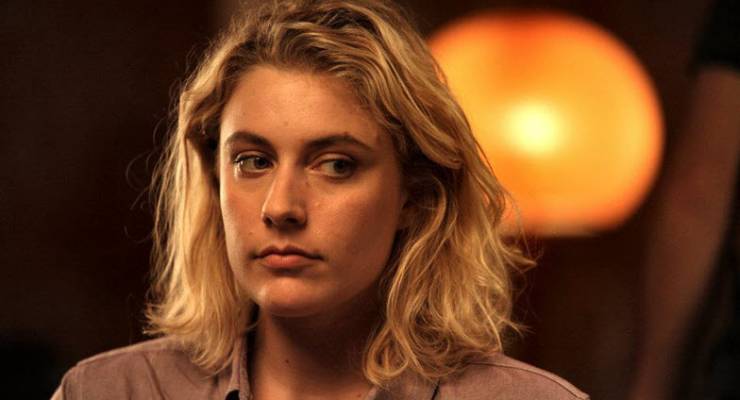
Greta Gerwig in To Rome with Love
“I reported Joel Kramer’s inappropriate sexual behavior towards 12-year-old Eliza [Dushku] to a person in authority. I was met with blank stares and had the sense that I wasn’t telling that person anything they didn’t already know.”— Child-minder Sue Booth-Forbes, in 2017.
“I really don’t give a fuck. Look, am I going to sit and weep every time a young hooker feels as though she’s been taken advantage of?… I was in the middle of all that. Back then, we all were. Everybody knew everybody else.” — Gore Vidal on Roman Polanski, in 2009.
By now, it should be obvious that if there is one thing sexual predators have in common, apart from their pervasiveness, it is the willingness of equally powerful adults to look the other way.
Nonetheless, one of the fruits of the #MeToo “movement” has been the increased scrutiny and condemnation of both Woody Allen and the actors who continue to work with him, as if they are something of an anomaly.
While the Farrow family’s singular focus on Allen and his collaborators is understandable and unsurprising, more puzzling is the extent to which social and some traditional media has taken its cues from the Farrows. The willingness to work with Woody Allen is being seen as a kind of litmus test for who cares about sexual assault in Hollywood and who doesn’t.
Allen, who was investigated but never charged, is not the only alleged abuser to enjoy a lucrative career and critical accolades. Director Roman Polanski who was charged, pled guilty, and convicted of plying a 13-year-old girl with Quaaludes and champagne before assaulting her, famously fled the US on bail before his sentencing hearing, and has at least four other allegations made against him.
Polanski’s greatest punishment seems to be having to accept his Oscar from “exile” in his European mansion, and yet there is no post #MeToo pressure on actors who’ve worked with him to grovel for forgiveness.
Meanwhile, “Why do actors still work with Allen?!” has not only morphed from a baffled query to a career-threatening accusation, as actor after actor publicly self-flagellates and donates their salary to charity in hopes of absolution — an expectation not held for the less glamorous roles of producers, cinematographers, and distributors — it has become an exercise in redundancy.
Of course, the answer to the now-rhetorical question lies not only in the (rapidly diminishing) prestige attached to Allen’s name, or in the assumption that some of them may well think him innocent, but in, as the above quotes indicate, the sheer scale of harassment and abuse that occurs in pretty much every working environment.
If actors had to keep a personal blacklist of all alleged, known, and suspected sexual predators, they would likely not make films at all (the merits of such a scenario are beyond the scope of this article). In a pre-#MeToo world of powerful Harvey Weinsteins, Nassers, Don Burkes, Kevin Spaceys, and Polanskis, actors (and crew, we keep forgetting about the crew!) continued working with Woody Allen frankly because it would have been highly hypocritical as well as possibly self-defeating not to.
Speaking of hypocrisy, Mia Farrow has yet to do what she publicly demands of others. The Rosemary’s Baby actor is still friends with Roman Polanski, who she regards as invaluable to the film industry (claims others make about Allen). Farrow defended him in a 2005 libel suit where she sneered at two “inappropriate” women for supposedly flirting with him in public. Now, I am not demanding Mia Farrow condemn Polanski right this second — virtual vigilantism is no more appealing to me than grabbing an actual pitchfork — because it is futile bordering on idiotic to blame actors for the actions of more powerful directors.
One of the most recent actors to be targeted was 22-year-old Timothee Chalamet, who was an unknown 20-year-old when signing on to the yet-to-be-released A Rainy Day In New York. Even after apologising and donating his salary from Allen’s film, the youngest ever male Best Actor Oscar nominee continued to be attacked for allegedly fibbing about his contractual obligations.
Punishment by proxy is not a legitimate form of activism and justice, no matter how satisfying it may momentarily feel, and Twitter users circulating an actual hit list of offending actors, as if hounding people until they submit proves nothing other than people sometimes fake contrition in order to be left alone.
Exploitation of power through sexual manipulation and abuse, mostly over women, is considered “part of the job”. If we are to be serious about changing the wider culture that celebrates male sexual entitlement, then at the very least, rather than picking on certain individuals who are paid to work in such an environment, our scrutiny should be aimed at those who sign the paychecks as they avert their eyes from what is happening before them.
Isolating actors for working with him is not only arbitrary, it indicates a willingness to prioritise some victims over others and place a personal cause over a collective solution.







You’re late for the lynching, but an admirable effort.